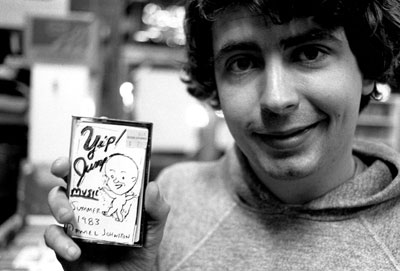The Music We Hate: Daniel Johnston
"Daniel Johnston sings about soda pop because he doesn’t think capitalism or empire or Coca-Colanization is a problem."
This is an online supplement to Maisonneuve's print-only "The Music We Hate" feature (Issue 36, Summer 2010). To read Carl Wilson on Radiohead, Sean Michaels on Sufjan Stevens and more, buy the print edition in stores or contact us to order it.

If you slapped Cheap Monday lab coats on all the tastemakers in the blogosphere and locked them in a laboratory, there’s still no chance they’d ever Frankenstein together Daniel Johnston. Pudgy and mentally ill, Johnston is equal parts Syd Barrett, Brian Wilson, Wesley Willis and Bazooka Joe bubblegum comic. He sings about Satan and Barbie and soda pop and King Kong. In so doing he has emerged as the unwitting poster boy of the so-called “New Sincerity” aesthetics in popular music—taken up by Will Oldham, Beat Happening, Joanna Newsom and others who shun ironic posturing for a more unselfconscious relationship to emotion, life experience and blah blah blah.
There is a certain naiveté in Johnston’s music that is easy to romanticize. This was especially true in the 1990s, when alternative rock music was typified by slackerish cynicism toward corporations, record labels, love songs and all the other trappings of staid bourgeois profiteering. Hardened punkers like Henry Rollins would have to concoct some whole new brand of irony to get away with singing campfire ditties about Mountain Dew or Casper the Friendly Ghost, but as warbled by the bipolar “genius” Johnston, such songs were just dandy.
Enter Kurt Cobain sporting a t-shirt emblazoned with the cover of Johnston’s Hi, How Are You?, filmmaker Larry Clark plopping Johnston songs onto the soundtrack of his teenage AIDS-panic provocation Kids and, in 2006, the release of Jeff Feuerzeig’s Sundance smash-hit documentary The Devil and Daniel Johnston.
Feuerzeig’s film is full of memorable scenes—Sonic Youth scouring Manhattan for a misplaced Johnston, Butthole Surfers frontman Gibby Haynes being interviewed while a dental hygienist slaves away on his formidably gnarly grill—but despite its merits, it remains most accountable for spurring a renewed interest in Johnston’s music and persona. This is not altogether a bad thing. Given the measured approach the film takes to Johnston’s alleged giftedness as a songwriter, it ends up posing many important questions about capital-a Authenticity in rock music. In the wake of the film, however, many new Johnston fans seem oblivious to such questions, opting for the easy answer that, yes, Johnston’s a real-McCoy musical virtuoso, and not just a curiosity.
Outsider musicians—those hardnosed radicals that recoil from the machinations of the commercial music industry—thrive on the idea of Authenticity. Captain Beefheart, the Shaggs, Skip Spence, the Residents: all operate on or well outside the fringes of popular taste. All are singularly unique. But interpreting idiosyncrasy as anything like
actual brilliance requires any number of spurious equations. Unlistenable? Uncompromising! Musically impenetrable? Sonically dense! Schizoid madman? Implacable Authentic!
Beyond these bogus equivalencies, appreciating Johnston also requires a good deal of sinister coddling. Those who dig him dig him because he’s so sincere; because—whether as a result of his natural disposition, bad trips on LSD, mental infirmity or some combination thereof—he lacks the ability to be snarky and ironic. Thumping on what sounds like a conked-out Hammond organ, on “Speeding Motorcycle” Johnston sings, “We don’t need reason and we don’t need logic/’Cos we got feeling and we’re dang proud of it.” A pretty sentiment, sure, but one hindered by our reflexivity and self-consciousness. So instead we divest ourselves in Johnston’s jejune defenselessness, allowing him to be innocent for us.
The past two decades of alternative rock have slouched halfheartedly against the corporate interests of major record labels, MTV, Rolling Stone and the rest; Johnston sings about soda pop because he doesn’t think capitalism or empire or Coca-Colanization is a problem. Like the chronic raving against the asylum, Daniel Johnston may be artless, unpolished and way out of his gourd, but goshdarnit, he’s real. (Check that audacious burp on “Catie”!)
This strategy for recuperating Johnston may typify our approach to many outsider artists. But the difference is that—unlike Captain Beefheart or Brian Wilson—Johnston’s kookiness isn’t backed up by the music itself. Strip away his compromised compos mentis and you’re left with crap like “Queenie the Doggie” from 2009’s Is and Always Was, a jingly-jangly ditty full of such empty lyrics as “Queenie the doggie, the special one/She always had the most fun most all of the time/Queenie the dog!”
To listen to Johnston is to hear the fractured echo of unrealized sincerity. We cannot be him, we cannot access his “authentic” experience, and so must romanticize him, cover his songs and sport his scribbled drawings like brand names. It’s a telling, too-obvious irony that you can now buy the Hi, How Are You? shirt made famous by Cobain for $40 at Urban Outfitters.
John Semley is a Maisonneuve contributing editor.
Related on maisonneuve.org:
—The Music We Hate: Destroyer
—The Music We Hate: Belle and Sebastian
—The Music We Hate: Timber Timbre
Subscribe to Maisonneuve — Follow Maisy on Twitter — Like Maisy on Facebook





